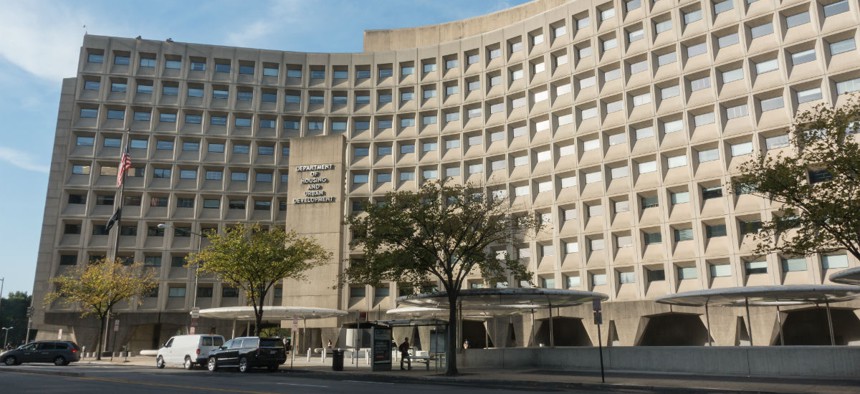
bakdc/Shutterstock.com
HUD Moves to Evict Union from Federal Office Space
Department leaders say they’re implementing Trump’s executive orders, but union officials say the move runs afoul of current law as well as the orders themselves.
Officials at the Housing and Urban Development Department told federal employee unions last week that they must vacate government-provided office space by mid-July, a move that union officials say is an attempt to undermine collective bargaining negotiations.
On June 14, the department issued a notice to the American Federation of Government Employees Council 222, which represents HUD employees, that it wishes to remove from AFGE’s existing collective bargaining agreement union employees’ right to HUD office space, phones, computers and other agency property by July 15. The proposal is intended to bring the department into compliance with President Trump’s recent executive order curbing official time, and it gives the union 15 days to demand to bargain, otherwise the eviction will move forward, the notice said.
But union officials said the effort runs afoul of both the 1978 Civil Service Reform Act and the executive order HUD officials cited as justification for the eviction. The executive order states that it does not “abrogate any collective bargaining agreement [already] in effect,” and Holly Salamido, president of the AFGE HUD council, said unions are not required to renegotiate existing CBA provisions outside of full term negotiations.
“We can only be required to engage in mid-term bargaining on matters not currently covered by the CBA,” Salamido said. “The law says that when you have a CBA in place, to reopen anything already covered in the agreement is called permissive bargaining, and we can decline to engage,” she said. “[There’s] federal law laid out in Federal Labor Relations Authority decisions saying that if a matter is already covered, you can only make changes if both parties agree.”
HUD spokesman Jereon Brown said the existing CBA “allows HUD to make proposed changes” and characterized the eviction notice as “simply” a proposal.
“We’re committed to good faith bargaining with the unions,” he said in an email. “However, HUD currently rents additional space for employees to work outside of its designated buildings in locations like Washington, D.C., and we also pay rent for union activity space in other locations nationwide. Utilizing that space for employees assisting in housing families in need would be a much more efficient use of taxpayer dollars.”
But Salamido said the move smacks of an attempt to hurt AFGE’s ability to bargain. Labor and management are slated to begin ground rule negotiations on a new full CBA on Tuesday, a process that has been in the works since before the executive orders were signed last month.
“This seems to be a deliberate attempt to undermine our ability to prepare and conduct these negotiations,” she said. “To throw us out on July 15 when we’re going into negotiations, we wouldn’t have copiers, we wouldn’t have scanners or telephones or private offices where we can hold discussions . . . And they know that our best negotiators will be engaged in the full-term negotiation, and we can’t have people be in two places at the same time.”
Any change to the collective bargaining agreement regarding union use of department office space and other resources should be done during the upcoming full CBA negotiation, Salamido said, adding that a “sarcastic” email from HUD Director of Employee and Labor Relations Joseph Sullivan suggests the move for parallel negotiations was not done in good faith.
“You will receive management’s preliminary proposals shortly,” Sullivan wrote in the email to Salamido. “We are eager to get into compliance with the EOs as quickly as possible. Given the number of union representatives receiving taxpayer funded union time, I’m confident that AFGE [Council] 222 has more than sufficient personnel to bargain these proposals without detracting from the term renegotiation.”
Salamido said the union is still weighing its options to fight the HUD eviction plan, but said filing an unfair labor practice may not be the most efficient option, because the Trump administration has not yet nominated a Federal Labor Relations Authority general counsel.
“This is clearly an unfair labor practice and it’s prohibited by statute,” she said. “But under the statute, the only person who can issue a complaint to the FLRA is the general counsel, and the Trump administration has deliberately not filled that position, so no complaints have gone forward . . . We will do everything we can to enforce our rights under the law.”
Image via bakdc/Shutterstock.com.







